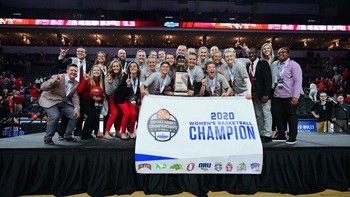Damon P Leader Charge of USD awarded Udall Scholarship
"I used to live a crazy life," admitted Leader Charge, the first USD Native American student to win an undergraduate Udall award. "Drugs and alcohol were affecting my life. I wasn’t going anywhere."
Leader Charge, a Sicangu Oglala Lakota and member of the Rosebud Sioux Tribe of western South Dakota, had enrolled at USD as a freshman in 1993 looking to earn his college degree, return home and serve as a role model to the troubled youths who had no direction, no desire to leave the poverty of the reservation behind. He stayed at USD for three-and-a-half years, but self-admittedly was "treading water without a support group" and, in 1997, he took a leave of absence.
"My dedication and determination wasn’t there," he explained. "I planned to stay out and looked into a couple of community colleges, the Oglala Lakota College and the Sinte Gleska University in Rosebud, to continue my education, but that never came about." Instead, Leader Charge focused more on getting into trouble than getting an education. Ultimately, he was scared straight, first by the law and then by the notion that he was letting his life waste away. Realizing his credits had originated at USD and he was familiar with the success of the University’s American Indian Studies program, he made his way back to campus – not to tread water but grow wings.
"It was a complete, 180-degree turnaround," noted Roger M. Baron, professor of law at the USD School of Law, who authored a letter of recommendation on Leader Charge’s behalf for the scholarship application. "I think he really wants to go back and make a difference, create new opportunities for the youths on the reservation and serve as a role model."
As one of 80 Udall Scholarship winners nationwide, including just 11 Native American students, Leader Charge will receive a $5,000 scholarship toward his undergraduate degree at The University of South Dakota. He will also attend a week-long seminar in Tucson, Ariz. this August to receive the award in addition to meeting with policymakers and community leaders in environmental fields, tribal healthcare and governance. He was nominated for the scholarship by Erin Contreras, Native American Cultural Coordinator, with the Native American Cultural Center at USD.
His desire to learn more about tribal healthcare and tribal government is crucial to Leader Charge’s future. His short-term goal is to bring something back to his tribe and serve as a role model to the underprivileged youths. Long-term he would like to be tribal chairman, and share the traditions and history of his people with younger generations in his tribe. Considering he’s not afraid to lead by example, those who know him believe Leader Charge is destined to make a difference.
"I have no doubt that Damon will get back to his tribe and make a difference," added Kurt Hackemer, professor of history and associate dean for academics in the College of Arts and Sciences, and the acting chair for the Institute of American Indian Studies at The U. "Before he gets there, though, he’s determined to equip himself with the skills to do it right."
Without hesitation, Leader Charge can name the positive influences that shaped his life on the USD campus, including Gene Thin Elk, director of Native American Student Service, and Baron, who Leader Charge says "literally took me under his wing," but it’s his mother, Shirley Big Eagle, he credits the most. Despite his ups and downs, she was always there to support him.
"She’s such a strong influence in his life," Baron said of Big Eagle, an Indian Child Welfare Specialist with the Rosebud Sioux Tribe. "It’s easy to see where he gets his drive to be successful."
While family is important to Leader Charge, responsibility is paramount. He believes in sharing his responsibility with his entire family, which includes his tribal family – not just his extended family. Leader Charge admits that as a “product of countless strong, beautiful men and women,” giving back to them is his ambition once he has completed his educational aspirations.
"All in all, it’s a chance to take the torch and carry out the teachings I’ve learned for the sake of The Next Seven Generations," said Leader Charge, who is considering graduate school as his next step once he graduates from The U in 2009.
"USD has been good to me," he added. "All the support here has been of high quality. The Alcohol and Drug Abuse Studies Department, especially Dr. Dona Kennealley, chair of the department; the Institute of American Indian Studies, Department of Indian Studies, Native Student Services have all been supportive. The TRIO program, Academic Advising and USD Honors, only to name a few, were the key to my success and it was the quality of support rather than quantity. I found a nice home here."
A photo of Leader Charge is available at www.usd.edu/urelations/images/Damon_Leader_Charge.jpg.


